-
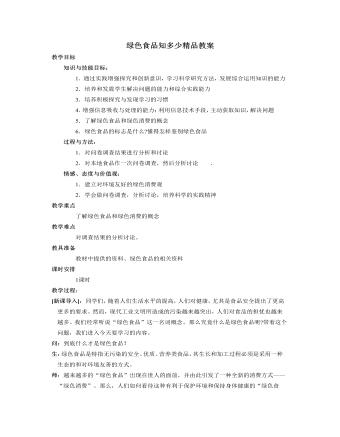
人教版高中地理必修2绿色食品知多少精品教案
生1:加强对绿色食品的宣传和扶持力度。当前的形势迫切要求我们发展绿色食品,因为绿色食品是真正实现可持续发展的,做到了发展经济和环境保护相结合,而且有利于增进人民身体健康。但目前绿色食品在市场上难成气候,主要是宣传和扶持不够。生2:绿色食品对环境、生长过程、加工过程以及运输等过程都有很严格的要求,很多环境相对优良的地区都是边远落后地区,必须给予政策上的扶持和优惠,才能降低成本,市场发展前景才会更加广阔。活动与探究对当地绿色食品市场情况作调查并初步分析。活动的实施过程:1.确定调查研究的目标并制定调查研究的计划。市场调查要深入广大消费者,可以去市场上做调查,‘对象包括消费者和经营者。形式可以是问卷,也可以是现场采访。弄清楚被调查者对绿色食品的态度,是否了解食用绿色食品的意义,是否懂得鉴别绿色食品等。对象力求涉及各个年龄段,多种职业。2.对问卷调查进行整理、分析,得出结论。
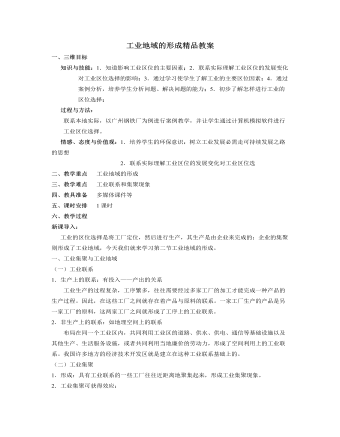
人教版高中地理必修2工业地域的形成精品教案
2.音响生产的工业集聚有哪些优势?点拨:可以加强各企业间的信息交流和技术协作,降低中间产品的运输费用和能源消耗,进而降低生产成本,提高生产效率和利润,取得规模效益。3.根据惠州音响零件的来源百分比,说明惠州音响零件供应厂家的地域分布有什么规律。点拨:距离递减规律,距离惠州音响整机组装厂越近的地区零件来源所占比例越高。三)工业地域工业联系—--------- 工业集聚------------工业地域工业地域:工业集聚而形成的地域称之为工业地域。1.工业地域形成的两种情况⑴自发形成的工业地域: 以生产工序上的工业联系为基础,以降低生产成本为目的。⑵规划建设的工业地域:如我国许多地方的经济技术开发区:①把生产上有投入 产出联系密切的工厂布局在一起。②先建成基础设施,再吸引投资者建厂,形成空间和信息共同利用的工业联系。我国许多地方的经济技术开发区,就是利用这一原理建成的。2.两类不同性质的工业地域
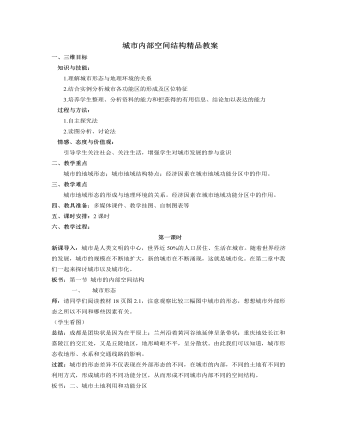
人教版高中地理必修2城市内部空间结构精品教案
过渡:在实际生活中,城市内部空间结构并非完全按照这一经济规律呈现,而是更具复杂性。这说明除了经济因素外,还有很多其他因素在起作用,请大家结合你的认识、图2.9和案例1:纽约市的少数民族区谈谈你的看法。(2)其他因素I.收入 —— 形成不同级别住宅区的常见原因。有能力支付昂贵租金和选择最佳居住环境的人,其居住地往往形成高级住宅区。II.知名度 ——城市内某些地区在历史、文化或经济方面具有很高的声誉,这往往会吸引更多新的住宅或商场建在该处,以提高其知名度。III.种族聚居区的形成 ——在有些城市的某一区域内,如果某个种族或宗教团体占优势,就可能形成种族聚居区。如纽约市的唐人街、哈林区、小意大利区等。IV历史因素——城市的建筑物和街道设计可以维持久远,早期的土地利用方式对日后的功能分区有着深远的影响。3、城市内部空间结构的形成和变化

人教版高中地理必修2不同等级城市的服务功能教案
1、 前提条件:①环境几乎一样的平原地区,人口分布均匀2、 ②区域的运输条件一致,影响运输的惟一因素是距离。城市六边形服务范围形成过程。(理解)a.当某一货物的供应点只有少数几个时,为了避免竞争、获取最大利润,供应点的距离不会太近,它们的服务范围都是圆形的。 b.在利润的吸引下,不断有新的供应点出现,原有的服务范围会因此而缩小。这时,该货物的供应处于饱和。每个供应点的服务范围仍是圆形的,并彼此相切c.如果每个供应点的服务范围都是圆形相切却不重叠的话,圆与圆之间就会存在空白区。这里的消费者如果都选择最近的供应点来寻求服务的话,空白区又可以分割咸三部分,分别属于三个离其最近的供应点。[思考]①图2.15中城市有几个等级?②找出表示每一等级六边形服务范围的线条颜色?③叙述不同等级城市之间服务范围及其相互关系?3、理论基础:德国南部城市4、意义:运用这种理论来指导区域规划、城市建设和商业网点的布局。1、 应用——“荷兰圩田居民点的设置”。
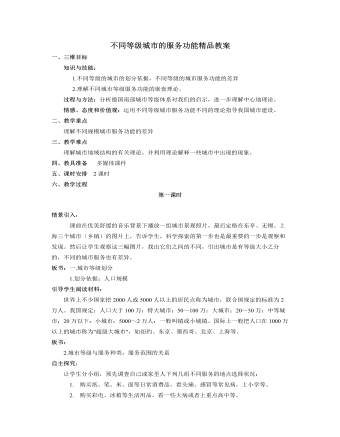
人教版高中地理必修2不同等级城市的服务功能精品教案
学生探究案例:找出不同等级城市的数目与城镇级别的关系、城镇的分布与城镇级别的关系并试着解释原因。在此基础上,指导学生一步步阅读书上的阅读材料,首先说明这是德国著名的经济地理学家克里斯泰勒对德国南部城市等级体系研究得出的中心地理论,他是在假设土壤肥力相等、资源分布均匀、没有边界的平原上,交通条件一致、消费者收入及需求一致、人们就近购买货物和服务的情况下得出的理想模式。然后指导学生阅读图2.14下文字说明,理解城市六边形服务范围形成过程。指导学生读图2.15,找出图中城市的等级、每一等级六边形服务范围并叙述不同等级城市之间服务范围及其相互关系,从而得出不同等级城市的空间分布规律,六边形服务范围,层层嵌套的理论模式。给出荷兰圩田空白图,让学生应用上面的理论规划设计居民点并说出理由,再和教材上的规划进行对照。然后给出长三角地区城市分布图和各城市人口数,让学生对这些城市进行分级,概括每一级城市的服务功能、统计每一等级城市的数目以及彼此间的平均距离,总结城市等级与服务范围、空间分布的关系?
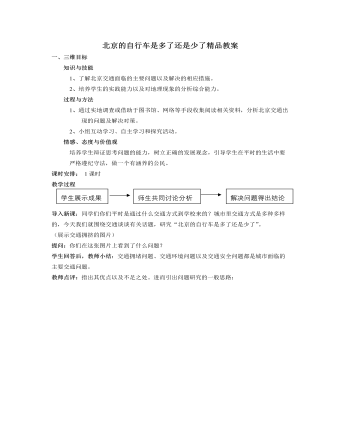
人教版高中地理必修2北京的自行车是多了还是少了精品教案
提问:城市环境污染源主要有哪些?有些同学基本同意自行车多是加剧南京空气污染的间接原因,你同意他们的观点吗?在学生回答的基础上,教师进行归纳小结:工业和交通是城市环境的主要污染源。而自行车是一种绿色交通工具,既环保又经济。只有当它在某些机动车和非机动车不分的地段,影响车辆行驶速度的时候,它才可能成为加剧空气污染的间接原因。问:那我们针对交通工具对环境造成的影响,有什么解决方法吗?归纳小结:? 实施减少汽车尾气污染的技术措施? 加强道路绿化? 合理规划城市道路,提高车速? 制定相关法规严禁各种车辆违规鸣喇叭? 在噪音严重的地区设置先进的隔音设施总结:通过前面的分析我们知道了自行车过多并不是造成北京交通拥挤的主要原因,但自行车多并且不遵守交通规则的确是造成交通拥堵的一个原因。从这方面来讲,在一些混合车道地段,自行车是造成空气污染加剧的间接原因。那么在北京到底是应该鼓励自行车的发展还是限制自行车的发展呢?
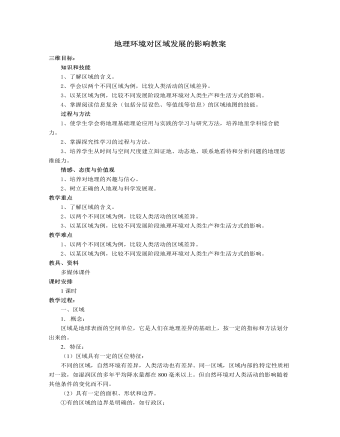
人教版高中地理必修3地理环境对区域发展的影响教案
(1)下面列出的是我国南北方传统民居的差异,分析形成这些差异的自然原因:——北方民居正南正北的方位观比南方强;——北方民居的墙体严实厚重,南方民居的墙体轻薄;——从北到南,民居的屋顶坡度逐渐增大,房檐逐渐加宽,房屋进深和高度逐渐加大。(2)下面列出的是我国南北方城市住宅搂的差异,分析导致这些差异的自然原因:——如果不考虑地价、建筑材料等因素,建同等面积的住房,北方的建筑成本比南方高 ;——建同样高度的多幢楼房,北方楼房的南北间距比南方大。点拨:本活动要求学生了解由于地理环境的差异造成南北方建筑物特点的不同,并由此认识地理环境 差异对人们生活的影响。(1)比较而言,北方的冬季寒冷而漫长,南方的夏季湿热而漫长。为了在冬季充分利用太阳光照和热量,北方民居正南正北的方位观比南方强。北方民居的墙体严实厚重,利用在冬季保温御寒;南方民居的墙体轻薄,利于在夏季通风透气。从北到南,年降水量逐渐增大,民居的屋顶坡度也逐渐增大(利于排水) ;随着对保温要求的降低和对通风纳凉要求的提高,民居的屋檐逐渐加宽,房屋进深和高度逐渐加大。
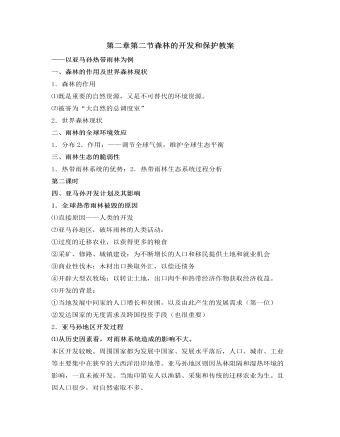
人教版高中地理必修3第二章第二节森林的开发和保护教案
活动建议:亚马孙雨林的开发和保护,一直作为一个两难问题困扰着决策者们。这三个议题的提出,为决策者们提供了思考的途径,其实这也是国际社会的呼声。活动中,可以让同学们任意选一个感兴趣的议题,进行评述、整理、发挥,然后进行交流,达成共识。或以板报的形式 进行。板书设计第二节 森林的开发和保护——以亚马孙热带雨林为例四、亚马孙开发计划及其影响1.全球热带雨林被毁的原因⑴直接原因——人类的开发⑵亚马孙地区,破坏雨林的人类活动:⑶开发的背景:2.亚马孙地区开发过程⑴从历史因素看,对雨林影响不大。⑵20世纪五六十年代后,影响逐渐加大3.亚马孙流域 大规模开发计划⑴修建亚马孙横贯公路 ⑵移民亚马孙平原⑶借助外资、鼓励跨国企业投资开发五、雨林的前途——开发还是保护1.目前,全球的热带雨林正以惊人的速度不断减少。2.亚马孙这片全球最大的热带雨林,前景也同样不容乐观。3.开发 与保护?

人教版高中地理必修3第五章第二节产业转移教案
1.阅读图5.16,说明产业向国外转移对日本经济的不利影响。点拨:图5.16直观的显示了产业转移对日本经济的不利影响:形成“产业转移出去的多,转移进来的少→国内生产投资不足,生产困难→市场萎缩→产业向外转移,外资不愿进入”的恶性循环。2.尽管重化工业的环境污染比较严重,但是却能为工业化的发展提供坚实的基础,因此成为发达工业的象征。日本、韩国的经济发展都经历了由轻工业(劳动密集型)到重化工业(资源密集型和资金密集型)到高科技工业(技术密集型)的阶段。(1)为什么日本、韩国在重点发展重化工业之前,要先发展劳动密集型工业?点拨:重化工业的发展一方面需要有一定的工业基础和技术工人,另一方面需要投入大量的资金,先发展劳动密集型工业有利于利用劳动力资源丰富且廉价的优势,积累资金和造就产业工人。所以,劳动力丰富的发展中国家或地区的工业化往往从优先发展劳动密集型工业开始。
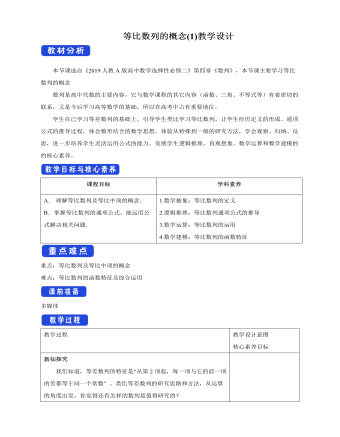
人教版高中数学选择性必修二等比数列的概念 (1) 教学设计
新知探究我们知道,等差数列的特征是“从第2项起,每一项与它的前一项的差都等于同一个常数” 。类比等差数列的研究思路和方法,从运算的角度出发,你觉得还有怎样的数列是值得研究的?1.两河流域发掘的古巴比伦时期的泥版上记录了下面的数列:9,9^2,9^3,…,9^10; ①100,100^2,100^3,…,100^10; ②5,5^2,5^3,…,5^10. ③2.《庄子·天下》中提到:“一尺之锤,日取其半,万世不竭.”如果把“一尺之锤”的长度看成单位“1”,那么从第1天开始,每天得到的“锤”的长度依次是1/2,1/4,1/8,1/16,1/32,… ④3.在营养和生存空间没有限制的情况下,某种细菌每20 min 就通过分裂繁殖一代,那么一个这种细菌从第1次分裂开始,各次分裂产生的后代个数依次是2,4,8,16,32,64,… ⑤4.某人存入银行a元,存期为5年,年利率为 r ,那么按照复利,他5年内每年末得到的本利和分别是a(1+r),a〖(1+r)〗^2,a〖(1+r)〗^3,a〖(1+r)〗^4,a〖(1+r)〗^5 ⑥
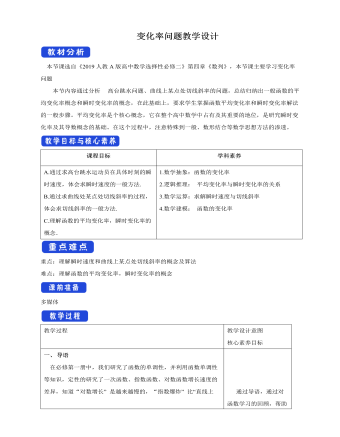
人教版高中数学选择性必修二变化率问题教学设计
导语在必修第一册中,我们研究了函数的单调性,并利用函数单调性等知识,定性的研究了一次函数、指数函数、对数函数增长速度的差异,知道“对数增长” 是越来越慢的,“指数爆炸” 比“直线上升” 快得多,进一步的能否精确定量的刻画变化速度的快慢呢,下面我们就来研究这个问题。新知探究问题1 高台跳水运动员的速度高台跳水运动中,运动员在运动过程中的重心相对于水面的高度h(单位:m)与起跳后的时间t(单位:s)存在函数关系h(t)=-4.9t2+4.8t+11.如何描述用运动员从起跳到入水的过程中运动的快慢程度呢?直觉告诉我们,运动员从起跳到入水的过程中,在上升阶段运动的越来越慢,在下降阶段运动的越来越快,我们可以把整个运动时间段分成许多小段,用运动员在每段时间内的平均速度v ?近似的描述它的运动状态。
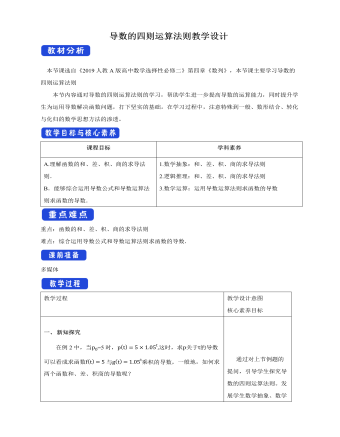
人教版高中数学选择性必修二导数的四则运算法则教学设计
求函数的导数的策略(1)先区分函数的运算特点,即函数的和、差、积、商,再根据导数的运算法则求导数;(2)对于三个以上函数的积、商的导数,依次转化为“两个”函数的积、商的导数计算.跟踪训练1 求下列函数的导数:(1)y=x2+log3x; (2)y=x3·ex; (3)y=cos xx.[解] (1)y′=(x2+log3x)′=(x2)′+(log3x)′=2x+1xln 3.(2)y′=(x3·ex)′=(x3)′·ex+x3·(ex)′=3x2·ex+x3·ex=ex(x3+3x2).(3)y′=cos xx′=?cos x?′·x-cos x·?x?′x2=-x·sin x-cos xx2=-xsin x+cos xx2.跟踪训练2 求下列函数的导数(1)y=tan x; (2)y=2sin x2cos x2解析:(1)y=tan x=sin xcos x,故y′=?sin x?′cos x-?cos x?′sin x?cos x?2=cos2x+sin2xcos2x=1cos2x.(2)y=2sin x2cos x2=sin x,故y′=cos x.例5 日常生活中的饮用水通常是经过净化的,随着水的纯净度的提高,所需进化费用不断增加,已知将1t水进化到纯净度为x%所需费用(单位:元),为c(x)=5284/(100-x) (80<x<100)求进化到下列纯净度时,所需进化费用的瞬时变化率:(1) 90% ;(2) 98%解:净化费用的瞬时变化率就是净化费用函数的导数;c^' (x)=〖(5284/(100-x))〗^'=(5284^’×(100-x)-"5284 " 〖(100-x)〗^’)/〖(100-x)〗^2 =(0×(100-x)-"5284 " ×(-1))/〖(100-x)〗^2 ="5284 " /〖(100-x)〗^2

人教版高中数学选择性必修二导数的概念及其几何意义教学设计
新知探究前面我们研究了两类变化率问题:一类是物理学中的问题,涉及平均速度和瞬时速度;另一类是几何学中的问题,涉及割线斜率和切线斜率。这两类问题来自不同的学科领域,但在解决问题时,都采用了由“平均变化率”逼近“瞬时变化率”的思想方法;问题的答案也是一样的表示形式。下面我们用上述思想方法研究更一般的问题。探究1: 对于函数y=f(x) ,设自变量x从x_0变化到x_0+ ?x ,相应地,函数值y就从f(x_0)变化到f(〖x+x〗_0) 。这时, x的变化量为?x,y的变化量为?y=f(x_0+?x)-f(x_0)我们把比值?y/?x,即?y/?x=(f(x_0+?x)-f(x_0)" " )/?x叫做函数从x_0到x_0+?x的平均变化率。1.导数的概念如果当Δx→0时,平均变化率ΔyΔx无限趋近于一个确定的值,即ΔyΔx有极限,则称y=f (x)在x=x0处____,并把这个________叫做y=f (x)在x=x0处的导数(也称为__________),记作f ′(x0)或________,即
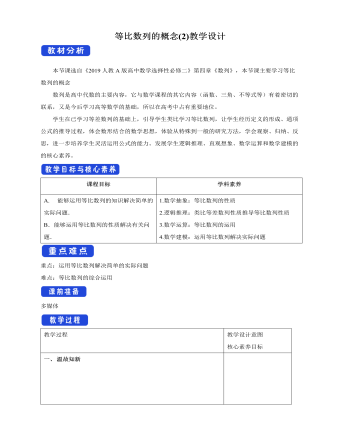
人教版高中数学选择性必修二等比数列的概念 (2) 教学设计
二、典例解析例4. 用 10 000元购买某个理财产品一年.(1)若以月利率0.400%的复利计息,12个月能获得多少利息(精确到1元)?(2)若以季度复利计息,存4个季度,则当每季度利率为多少时,按季结算的利息不少于按月结算的利息(精确到10^(-5))?分析:复利是指把前一期的利息与本金之和算作本金,再计算下一期的利息.所以若原始本金为a元,每期的利率为r ,则从第一期开始,各期的本利和a , a(1+r),a(1+r)^2…构成等比数列.解:(1)设这笔钱存 n 个月以后的本利和组成一个数列{a_n },则{a_n }是等比数列,首项a_1=10^4 (1+0.400%),公比 q=1+0.400%,所以a_12=a_1 q^11 〖=10〗^4 (1+0.400%)^12≈10 490.7.所以,12个月后的利息为10 490.7-10^4≈491(元).解:(2)设季度利率为 r ,这笔钱存 n 个季度以后的本利和组成一个数列{b_n },则{b_n }也是一个等比数列,首项 b_1=10^4 (1+r),公比为1+r,于是 b_4=10^4 (1+r)^4.

人教版高中数学选择性必修二等比数列的前n项和公式 (2) 教学设计
二、典例解析例10. 如图,正方形ABCD 的边长为5cm ,取正方形ABCD 各边的中点E,F,G,H, 作第2个正方形 EFGH,然后再取正方形EFGH各边的中点I,J,K,L,作第3个正方形IJKL ,依此方法一直继续下去. (1) 求从正方形ABCD 开始,连续10个正方形的面积之和;(2) 如果这个作图过程可以一直继续下去,那么所有这些正方形的面积之和将趋近于多少?分析:可以利用数列表示各正方形的面积,根据条件可知,这是一个等比数列。解:设正方形的面积为a_1,后续各正方形的面积依次为a_2, a_(3, ) 〖…,a〗_n,…,则a_1=25,由于第k+1个正方形的顶点分别是第k个正方形各边的中点,所以a_(k+1)=〖1/2 a〗_k,因此{a_n},是以25为首项,1/2为公比的等比数列.设{a_n}的前项和为S_n(1)S_10=(25×[1-(1/2)^10 ] )/("1 " -1/2)=50×[1-(1/2)^10 ]=25575/512所以,前10个正方形的面积之和为25575/512cm^2.(2)当无限增大时,无限趋近于所有正方形的面积和
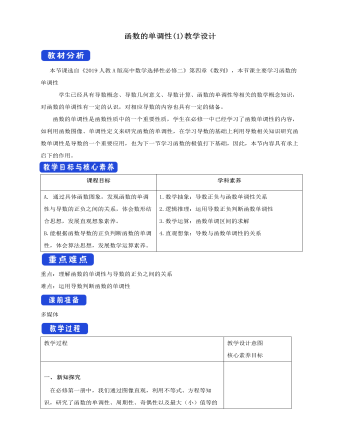
人教版高中数学选择性必修二函数的单调性(1) 教学设计
1.判断正误(正确的打“√”,错误的打“×”)(1)函数f (x)在区间(a,b)上都有f ′(x)<0,则函数f (x)在这个区间上单调递减. ( )(2)函数在某一点的导数越大,函数在该点处的切线越“陡峭”. ( )(3)函数在某个区间上变化越快,函数在这个区间上导数的绝对值越大.( )(4)判断函数单调性时,在区间内的个别点f ′(x)=0,不影响函数在此区间的单调性.( )[解析] (1)√ 函数f (x)在区间(a,b)上都有f ′(x)<0,所以函数f (x)在这个区间上单调递减,故正确.(2)× 切线的“陡峭”程度与|f ′(x)|的大小有关,故错误.(3)√ 函数在某个区间上变化的快慢,和函数导数的绝对值大小一致.(4)√ 若f ′(x)≥0(≤0),则函数f (x)在区间内单调递增(减),故f ′(x)=0不影响函数单调性.[答案] (1)√ (2)× (3)√ (4)√例1. 利用导数判断下列函数的单调性:(1)f(x)=x^3+3x; (2) f(x)=sinx-x,x∈(0,π); (3)f(x)=(x-1)/x解: (1) 因为f(x)=x^3+3x, 所以f^' (x)=〖3x〗^2+3=3(x^2+1)>0所以f(x)=x^3+3x ,函数在R上单调递增,如图(1)所示
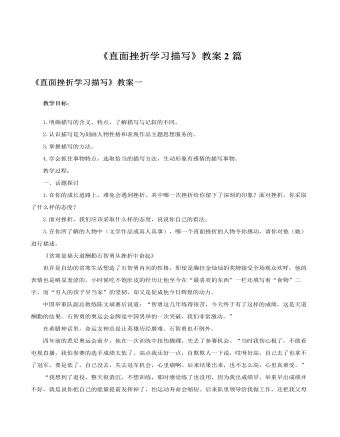
人教版高中语文必修2《直面挫折学习描写》教案2篇
《贫寒是福天道酬勤石智勇从挫折中奋起》也许是自幼的贫寒生活塑造了石智勇内向的性格,即使是胸挂金灿灿的奖牌接受全场观众欢呼,他的表情也是略显羞涩的。小时候吃不饱肚皮的经历让他至今在“最喜欢的东西”一栏还填写着“食物”二字,而“穷人的孩子早当家”的坚韧,却又是促成他今日辉煌的动力。中国举重队副总教练陈文斌赛后说道:“智勇这几年练得很苦,今天终于有了这样的成绩,这是天道酬勤的结果。石智勇的奥运会金牌是中国男举的一次突破,我们非常激动。”在希腊神话里,命运女神总是让英雄历经磨难。石智勇也不例外。四年前的悉尼奥运会前夕,他在一次训练中扭伤脚踝,失去了参赛机会。“当时我伤心极了,不敢看电视直播,我怕参赛的选手成绩太低了。高点我还好一点,自欺欺人一下说,哎呀好高,自己去了也拿不了冠军,要是低了,自己没去,失去冠军机会,心里痛啊。后来结果出来,也不怎么高,心里真难受。”

人教版高中历史必修2第二次工业革命教案2篇
请回答:根据上述材料,概述第二次工业革命兴起的主要原因。〖参考答案〗①政治上,资本主义制度在世界范围内的确立,为第二次工业革命提供了政权保障。②市场上,世界市场进一步拓展,推动生产进步发展。③科技上,19世纪自然科学的飞速发展与重大突破。④劳动力上,拥有更多、素质更好的自由劳动力。⑤经济上,拥有更加雄厚的资本。探索攻关二:第二次工业革命与垄断组织的出现的关系材料一第二次工业革命产生的新兴工业部门,在厂房、设备、技术要求和产品结构的复杂性等方面,都对生产组织提出了新的要求。这是过去的独家企业无法满足的,而且一般没有足够的资金。……于是,集中资金的合股公司迅速增加起来,起大型企业垄断组织也就应运而生。

人教版高中历史必修3从“师夷长技”到维新变法教案
4、维新思想推动下的变法运动虽然失败了。但这是中国近代真正意义上的一次思想解放潮流,为什么?展开:维新派提倡西学,兴民权,对封建专制制度和传统观念进行了冲击,促进了中国人民的觉醒,为资产阶级民主思想的传播奠定了基础,具有思想解放的启蒙作用。是一次救亡图存的爱国运动,也是一次发展资本主义的改革运动;他们提倡资产阶级新学,批判封建主义旧学,引导人们重新认识世界,他们痛感民族危机的严重,号召人们奋起救国,谋求国家的独立富强;给古老的中国社会注入的活力是不可低估的,站在历史长河的高度看,由传统农耕社会向近代工业社会转变是一股不可抗拒的历史潮流,尽管它在19世纪末的中国遭到了暂时挫折,但对清朝的封建专制统治却是一次巨大的强烈的冲击波,它留下的痕迹是永不磨灭的,是永远鼓舞与启迪后人的。

新人教版高中英语必修3Unit 1 Festivals and Celebrations-Reading and Thinking教学设计
The topic of this part is “Discover the reasons for festivals and celebrations.The Listening & Speaking & Talking part aims at talking about the experiences and feelings or emotions about the festivals and celebrations. This section aims at detecting the reason why the people celebrate the festivals, the time, the places, the types and the way of celebrations. It also explains why some traditions in the old celebrations are disappearing, like the firecrackers in the big cities and some new things are appearing like the prosperity of business or commerce. 1. Students can talk about what festivals they know and the reasons and the way of celebrating them.2. Students should learn the reading skills such as the headline and get the topic sentences, the structures of articles.3. Students can understand the past, the present situation of some festival around the world and why there are some changes about them. 4. Students can have the international awareness about the festivals.1. Students should learn the reading skills such as the headline and get the topic sentences, the structures of articles.2. Students can understand the past, the present situation of some festival around the world and why there are some changes about them.Step 1 Lead in---Small talkWhat festival do you like best ? Why ?I like the Spring Festivals because I can set off the fireworks, receive the lucky money and enjoy the Gala with my families.Step 2 Before reading---Pair workWhy do people celebrate different festivals ?The Spring Festivals is to celebrate the end of winter and the coming of spring and new life.The Mid-autumn Day is to celebrate the harvest and admire the moon.

